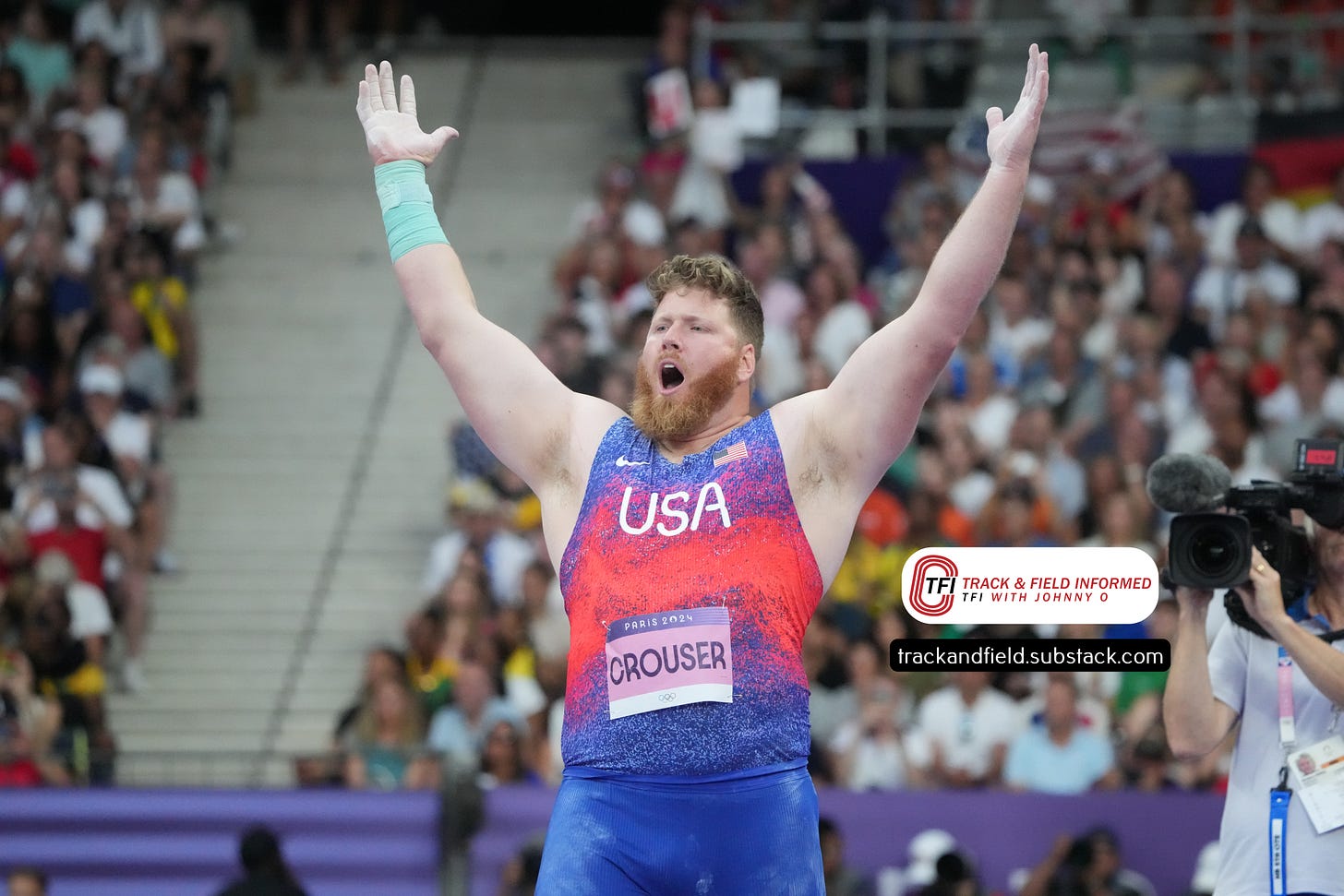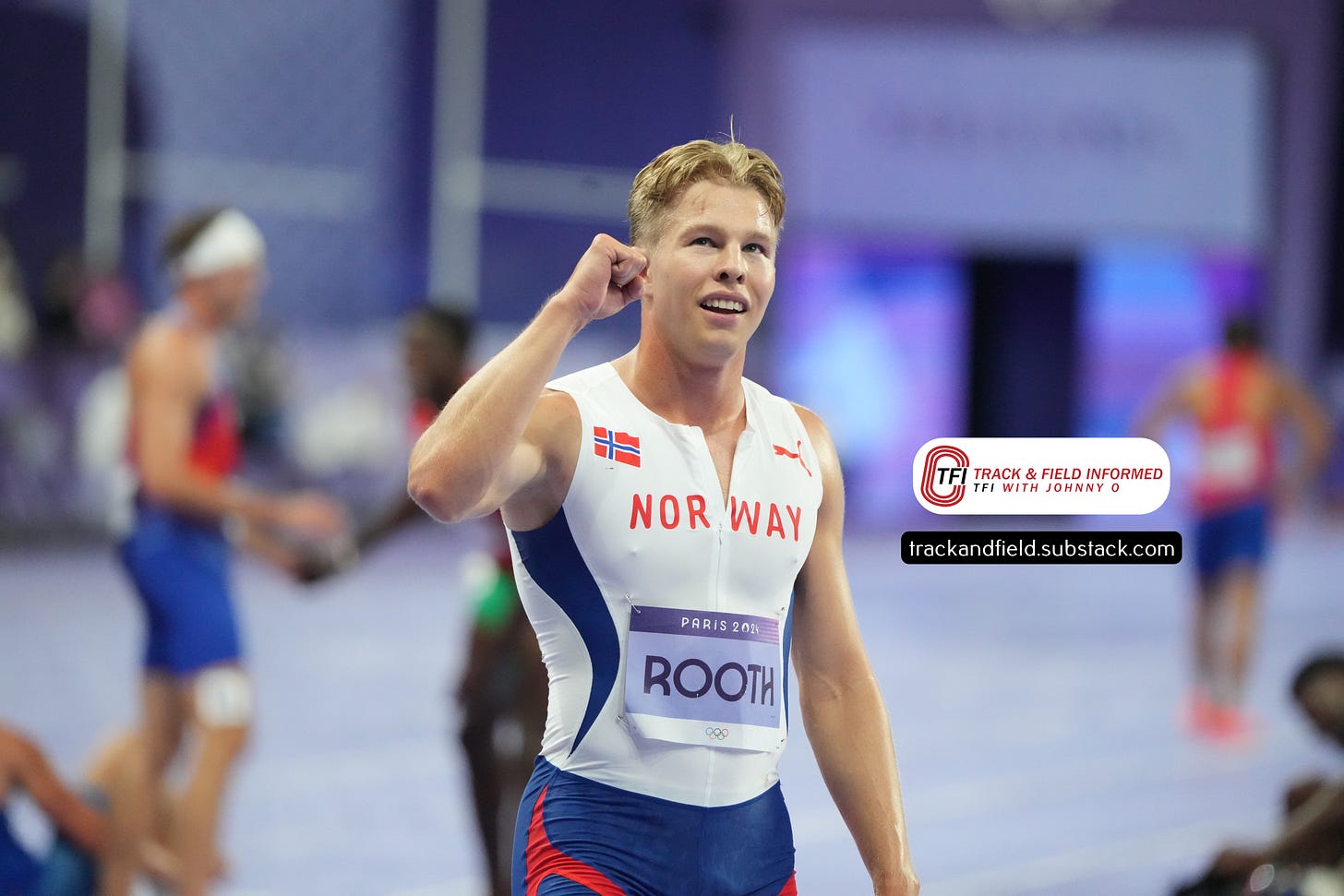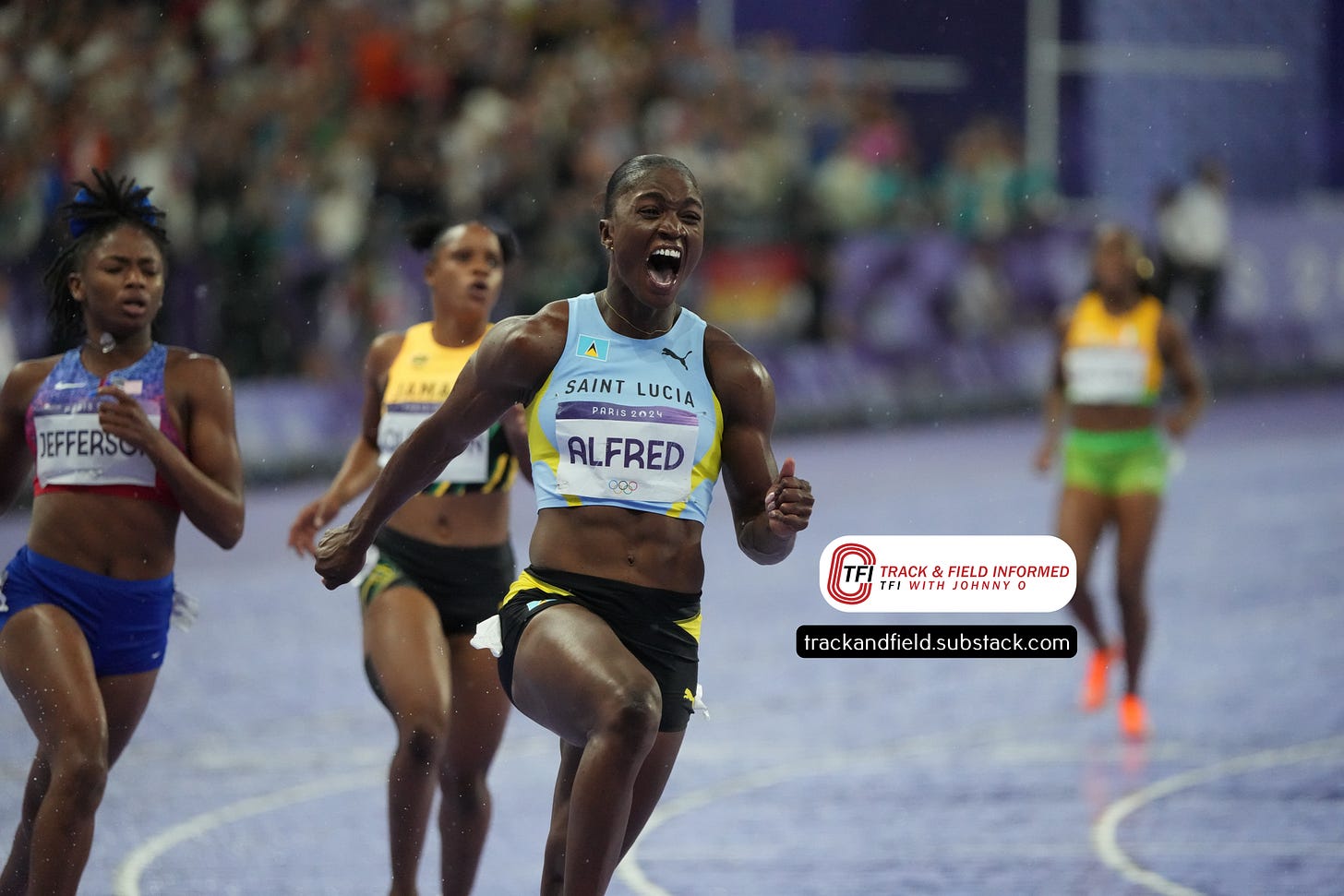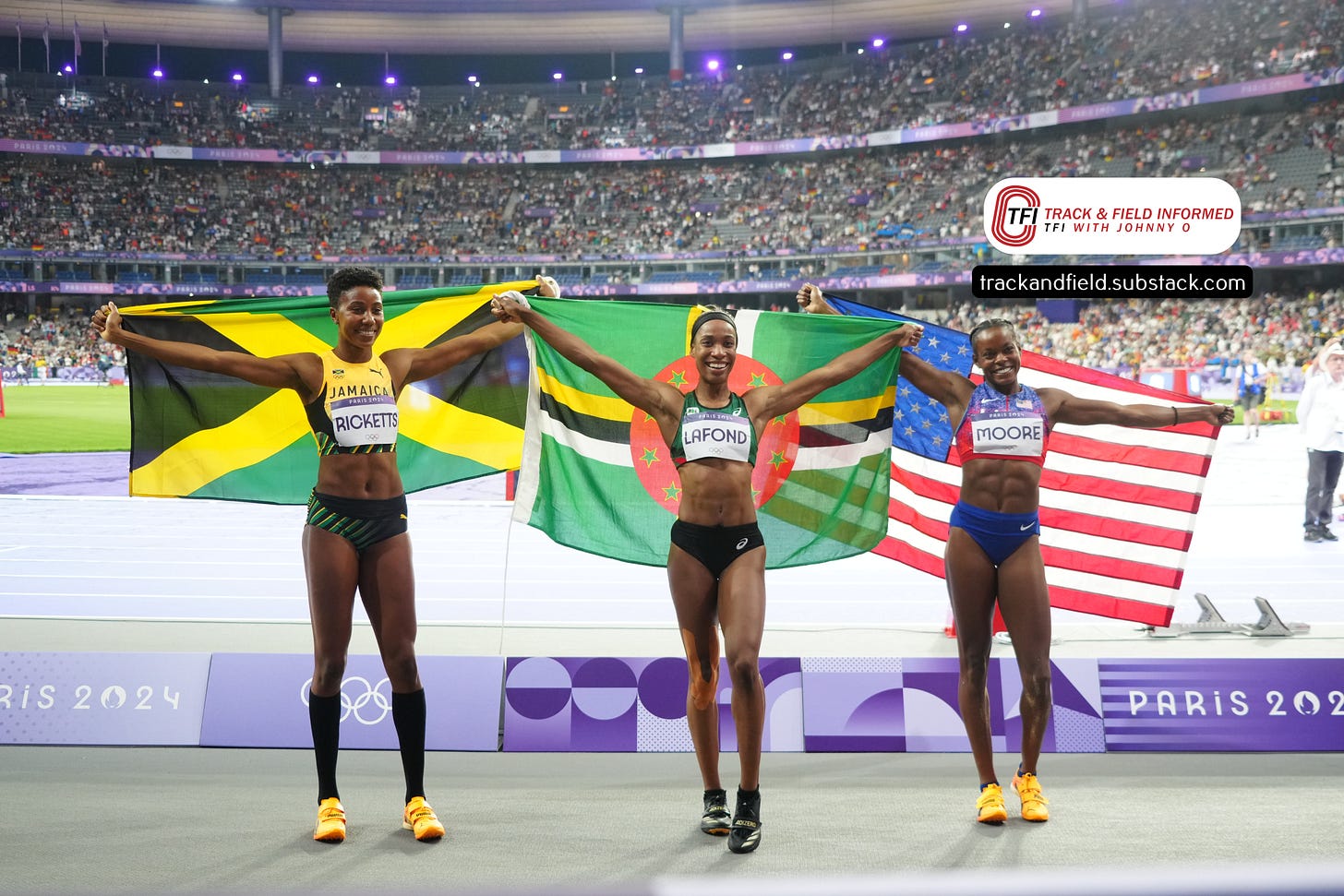Crouser makes Olympic history in Paris
American is first three-time winner of men's shot put after dominant performance

The late Parry O’Brien, one of the most influential figures in the history of the men’s shot put, met his match in the Olympic Games in Paris on Saturday when Ryan Crouser of the U.S. won the event in the Stade de France.
O’Brien, who passed away in 2007 at the age of 75, set a slew of world records during his career and was the first man to put the shot more than 18 meters (59 feet 0½ inch) and more than 19 meters (62-4), as well as more than 59, 60, 61, and 62 feet.
He was the top-ranked performer in the world by Track & Field News no less than seven times times during his career and won 116 consecutive meets at one point. In addition, he is credited with creating the glide technique that was used for decades before it was replaced by the spin that is so dominant today.
However, his quest to win three consecutive Olympic titles came up short in the 1960 Games in Rome when American teammate Bill Nieder won the event at 19.68 (64-6¾), well ahead of silver medalist O’Brien at 19.11 (62-8¼).
The 31-year Crouser entered Saturday’s competition as one of four men to have won two consecutive Olympic titles in the shot put and left it as the event’s first three-time winner as his top mark of 22.90 (75-1½) was a season best and nearly two and a half feet farther than the 22.15 (72-8) marks recorded by silver medalist Joe Kovacs of the U.S. and bronze medalist Rajindra Campbell of Jamaica.
Kovacs won his third consecutive Olympic silver medal ahead of Campbell because his second-best put of 21.71 (71-2½) was farther than Campbell’s No. 2 mark of 20.00 (65-7¼).
Payton Otterdahl of the U.S. placed fourth at 22.03 (72-3¼) and Leonardo Fabbri of Italy, who defeated Crouser in a Diamond League meet in London on July 20, finished fifth at 21.70 (71-2¼).
Fabbri had raised the Italian record to 22.95 (75-3½) earlier this season and was undefeated in 11 outdoor meets prior to the Olympics, but he fouled on four of his six attempts on Saturday and did not have a put of more than 22 meters (72-2) in a meet for the first time this season.
Injuries had forced Crouser to postpone the start of his outdoor season until the U.S. Olympic Team Trials in Eugene, Oregon, in late June, and the meet in London was only his second outdoor competition of the year. However, he had the three longest puts in the final on Saturday, as he produced a mark of 22.64 (74-3¼) in the first round, followed by efforts of 22.69 (74-5¾) on his second attempt and his winning 22.90 (75-1½) on his third.
It began to rain at the end of the third round and Crouser produced fouls on his fourth and fifth attempts before passing his sixth as he had clinched the gold medal at that point in the competition.
Campbell hit his 22.15 best in the second round and appeared to be headed to a silver medal as the rain intensified and the shot put ring became slicker and slicker. But Kovacs, who had fouled on his fourth and fifth attempts, moved from fourth place to second on his final effort when his 22.15 effort put him ahead of Campbell on the tiebreaker.
“I’m just honoured. I feel so lucky to be out there competing,” Crouser was quoted as saying in a World Athletics post. “This year hasn’t been easy. The elbow injury, the back. Just so many setbacks. There was a lot of self-doubt as to whether I would get back. It made it all the more special to be out there tonight. There were a lot of times I thought I might not be.”
Crouser has now won five global titles in the last four seasons as he followed his victory in the Olympic Games in Tokyo in 2021 by winning the World Athletics Championships in 2022 and last year, and garnering his first World indoor title in early March.
“The rain came in, and it was tough conditions towards the end,” he said. “It helped to be leading, but the throw of the day goes to Joe in round six. In the rain, improving from fourth place (to silver) was the most impressive throw I’ve ever seen him take.”
He then added that in “Tokyo, I felt so much pressure to perform because I had just thrown the world record. I was in fantastic shape. It felt like it was mine to lose. Tonight, I just felt happy to be here.”
While Crouser’s victory in the men’s shot put marked the 20th time — in 30 Olympics — that an American has won the event since the the first modern Olympic Games in 1896 in Athens, Markus Rooth won Norway’s first gold medal in the decathlon since the 1920 Games in Antwerp.
In addition, Julien Alfred of Saint Lucia and Thea LaFond of Dominica won their nation’s first-ever Olympic medals in any sport when they were victorious in the women’s 100 meters and triple jump, respectively.
The Netherlands, thanks to a stellar anchor leg by Femke Bol, also won its first Olympic title in the mixed 4 x 400-meter relay.

The 22-year-old Rooth was in seventh place, 191 points behind leader Leo Neugebauer of Germany at the start of the day. And he was in sixth place, 233 points behind Neugebauer, after running 14.25 seconds in the 110-meter high hurdles and throwing the discus 49.80 (163-4). But he moved up four spots during the pole vault as he cleared a personal best of 5.30 (17-4½) and defending champion Damian Warner of Canada and Norwegian teammate Sander Skothiem, who were in second and third place, both failed to clear a height and therefore garnered zero points in the event.
On top of that, he picked up 94 points on Neugebauer in the pole vault when the German had a so-so performance and cleared 5.00 (16-4¾).
That trimmed his deficit to 139 points and he took the lead after his personal best of 66.87 (219-4) in the javelin picked up 155 points on Neugebauer, whose top throw was 56.64 (185-9).
Although his lead was a narrow 16 points over Neugebauer entering the 1,500 meters, the final event of the decathlon, Rooth had traditionally been a better performer in that event than the German. And when he ran 4:39.56 to Neugebauer’s 4:44.67, his winning total of 8,796 points bettered the Norwegian record of 8,635 set by Skothiem in finishing second in the European Athletics Championships in June.
It also topped Rooth’s personal best of 8,608 points and moved him to 13th on the all-time performer list and to seventh on the all-time European list.
Neugebauer, who had moved to sixth on the all-time performer list when he totaled 8,961 in winning the NCAA title for the University of Texas in June, finished second with 8,748 points, followed by Lindon Victor of Grenada with 8,711, Sven Roosen of the Netherlands with 8,607, and the Estonian duo of Janek Oiglane with 8,572 and European champion Johannes Erm with 8,569.
A best-ever 10 men totaled more than 8,400 points in the competition.
Alfred, 23, scored a runaway victory in winning the women’s 100 that was run in a heavy rain as her national record of 10.72 seconds left her well in front of the U.S. duo of Sha’Carri Richardson and Melissa Jefferson, who finished second and third, respectively, in 10.87 and 10.92.
Daryll Neita of Great Britain placed fourth in 10.96, followed by TeeTee Terry of the U.S. in 10.97, and European champion Mujinga Kambundji of Switzerland in 10.99.
Tia Clayton of Jamaican placed seventh in 11.04 after winning her semifinal in 10.89 earlier in the day. It marked the first time since 1988 that no Jamaican had won a medal in the women’s 100 in the Olympic Games.
Alfred had finished fifth in the 100 in 10.93 in the the World Championships last year when Richardson set a meet record of 10.65 seconds, but that performance had come toward the end of a long year in which Alfred had won a combined four individual NCAA titles during the indoor and outdoor collegiate seasons for the University Texas.
This was her first full season as a professional and that allowed her to be much more selective about the races she ran, and thus much fresher at this point in the season.
Richardson had finished a tenth of a second in front of Alfred when she won the 100 in 10.83 in the Prefontaine Classic in late May, but one got the feeling after that race that Alfred was confident she could turn the tables on Richardson in Paris.

After running in separate first-round heats on Friday, Alfred defeated Richardson, 10.84 to 10.89, in the second semifinal on Saturday. That race was scheduled to include two-time Olympic champion Shelly-Ann Fraser-Pryce of Jamaica in what is expected to be the final meet of her illustrious career, but the sprinter affectionately known as Pocket Rocket withdrew from the heat.
After Alfred used one of her typically good starts to race to an early lead over Richardson in the semifinal, she beat everyone out of the blocks in the final, and when Richardson got off to a slow getaway, the race for the gold medal was essentially over 40 meters into the contest.
Although Richardson was able to overtake everyone else in the field during the second half of the race, she was unable to make a dent in the lead of Alfred, whose 10.72 clocking moved her into a tie for eighth on the all-time performer list and bettered her previous national record of 10.78 that she set in winning the Racers Grand Prix in Kingston, Jamaica, on June 1.
“I’m going to start crying. I’ve been trying to stay strong as much as possible. It means a lot to me, my coach, my country, which I’m sure is celebrating now,” Alfred was quoted as saying in a World Athletics post. “You don’t ever see me celebrate like that. I’m just happy it happened in the biggest race of my career. I watched Usain Bolt’s races this morning. I watched how he executed. I grew up watching him.
“Growing up, I used to be on the field struggling. With no shoes, running barefoot, running in my school uniform, running all over the place. I hope this gold medal will help Saint Lucia build a new stadium, to help the sport grow.”
The 30-year-old LaFond had set a Dominica record of 15.01 (49-2¾) in winning the women’s triple jump in the World Athletics Indoor Championships in Glasgow, Scotland, on March 3 and she topped that mark by a centimeter on Friday as her 15.02 (49-3¼) effort gave her a solid margin of victory over silver medalist Shanieka Ricketts of Jamaica, who leaped 14.87 (48-9¼).
Jasmine Moore of the U.S. won the bronze medal with a jump of 14.67 (48-1½), and she was followed by the Cuban duo of Liadamis Povea at 14.64 (48-0¼) and Leyanis Perez Hernandez at 14.62 (47-11½), and Spain’s Ana Peleteiro-Compaore at 14.59 (47-10¼).
All three medalists produced their best jumps in the second round.
“It is absolutely beyond my wildest dreams,” LaFond said in a World Athletics post. “We always said it takes one jump. Second jump at the World Indoor Championships was the big one. Second jump outdoors at the Olympics was the big one, that’s what it took.
“The rain was kind of in my favour, it came down as soon as I was done with that second jump – thank you God for working with me.
“Here we are, Olympic champ! Dominica’s first medal, it’s gold. Indoor was the first medal, it was gold. What a year, what a life, oh my God, wow.”

The U.S. was heavily favored to win the mixed 4 x 400 relay after a team of Vernon Norwood, Shamier Little, Bryce Deadmon, and Kaylyn Brown had slashed the world record from 3:08.80 to 3:07.41 in its qualifying heat on Friday.
However, that same American foursome finished second in the final after Bol brought the Dutch squad from fourth place to first on her anchor leg. Although there seems to be a question about her exact split, it does appear that it was a carry in the 47.8- to 47.9-second range.
Belgium had a small lead over the U.S. after Alexander Doom ran 44.3 to Norwood’s 44.5 on the opening leg. But Little had given the U.S. a 1:33.9 to 1:34.5 lead over second-place Belgium after her split of 49.4.
The Netherlands, thanks to a 49.3 split from Lieke Klaver, was in third at 1:34.6 at that point in the race, followed by Great Britain at 1:34.8.
Belgium and the U.S. had identical times of 2:18.6 at the end of the third leg after Belgium’s Jonathan Sacoor was credited with a 44.1 split to Deadmon’s 44.7. Great Britain and the Netherlands were at 2:19.2 and 2:19.5, respectively.
Brown quickly took over the lead from Naomi van den Broeck around the turn with her former University of Arkansas teammate Amber Anning of Great Britain and Bol also making up ground on the Belgium anchor runner.
Brown, who clocked a personal best of 49.13 seconds while finishing second in the NCAA championships in June, appeared to have the race under control midway through the second turn. But that was when Bol began to make up ground on Anning.
The Dutchwoman really began to reel her in with about 70 meters left in the race and after moving into second place she set her sights on Brown, who was obviously laboring, and sped past her with about 15 meters to go.
The Netherlands’ winning time of 3:07.43 missed the day-old world record by a miniscule two hundredths of a second as the U.S. finished second in 3:07.74, followed by Great Britain’s national record of 3:08.01 in third place and Belgium’s national best of 3:09.36 in fourth.
Jamaica and Italy finished fifth and sixth in times of 3:11.67 and 3:11.84, respectively.
Bol’s anchor leg was reminiscent of her carry in the women’s 4 x 400 in last year’s World Championships when she passed the anchor runners for Great Britain and then Jamaica in the final stages of the race to win the gold medal.
That leg had come eight days after she had fallen to the track with less than 10 meters left in the mixed 4 x 400 relay as she tried to hold off fast-closing Alexis Holmes of the U.S.
“I channelled my anger from Budapest,” Bol was quoted as saying in a World Athletics post. “And I saw my teammates cheering for me.”
She added that her top priority was to help her team win a medal, something it was unable to do after Bol went down in the final meters of last year’s race.
“I just went for it,” she said. “We just wanted a medal this time. We just wanted a medal. Well, we got gold. It’s absolutely crazy for a small country like us.”
In addition to the five medal events on Saturday, first-round heats were contested in the men’s 100 meters and qualifying was conducted in the men’s pole vault.
Repechage races were also held in the men’s 1,500 meters and the women’s 800.
In the men’s 100, all of the most highly-regarded entrants advanced to the semifinals on Sunday.
The fastest heat winners were Americans Kenny Bednarek and 2022 World champion Fred Kerley at 9.97 seconds, with Louie Hinchliffe of Great Britain clocking 9.98 and Oblique Seville of Jamaica timing 9.99.
Noah Lyles finished second to Hinchliffe in an easy-looking 10.04 as the top three finishers in each of the eight heats automatically advanced to the semifinals on Sunday, as did the next three fastest sprinters who did not place among the top three in their respective heats.
Kishane Thompson of Jamaica, the yearly world leader at 9.77 seconds, won his heat in 10.00. The other three heat winners were Kayinsola Ajayi of Nigeria in 10.02, Akani Simbine of South Africa in 10.03, and Ferdinand Omanyala of Kenya in 10.08.
Defending Olympic champion Marcell Jacobs of Italy ran 10.05 while finishing second behind Ajayi.
In the men’s pole vault, defending Olympic champion Mondo Duplantis of Sweden was one of the five men who led qualifying by clearing 5.75 (18-10¼) on their first attempts.
The other vaulters who did that were Sondre Guttormsen of Norway, Emmanouil Karalis of Greece, Ersu Sasma of Turkey, and Oleg Zernikel of Germany.
Chris Nilsen of the U.S. was a notable non-qualifier as he needed two tries to clear 5.40 (17-8½) and missed all three of his attempts at 5.60 (18-4¼).
Nilsen was the silver medalist in the Olympic Games in Tokyo in 2021 and in the World Championships in 2022 before finishing in a tie for third in last year’s global title meet.
In the repechage round of the men’s 1,500, Cathal Doyle of Ireland won the first heat in 3:34.92, with the other qualifying spots for the semifinals going to Azeddine Habz of France in 3:35.10, and Ossama Meslek of Italy in 3:35.32.
In the second heat, the top three finishers were Federico Riva of Italy in a personal best of 3:32.84, Charles Philibert-Thiboutot of Canada in 3:33.53, and George Mills of Great Britain in 3:33.56.
In the repechage round of the women’s 800, the winner of each of the four heats, plus the next two fastest runners who did not win their heat advanced to the semifinals.
Abbey Caldwell of Australia was the lone qualifier out of the first heat with her winning time of 2:00.07.
Anais Bourgoin of France won the second heat in 1:59.52 and Valentina Rosamilla of Switzerland also advanced with a second-place time of 1:59.65.
Rose Mary Almanza of Cuba was the solo qualifier from heat three with a winning time of 2:01.54, while Majtie Kolberg of Germany won heat four in 1:59.08 and Vivian Chebet Kiprotich of Kenya also advanced with a second-place time of 1:59.31.
The three finals that will be contested on Sunday are the men’s 100 meters, the men’s hammer throw, and the women’s high jump.
You can click here for a daily schedule of events, as well as start lists and up-to-date results.



